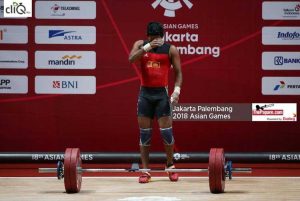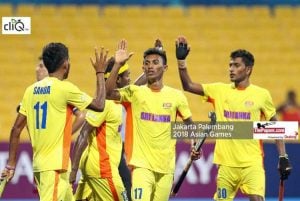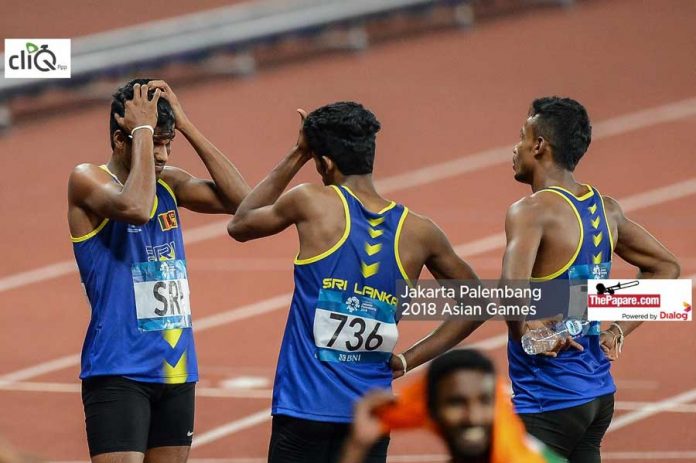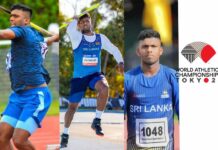The 18th edition of one of the largest multisport spectacles in the world, Asian Games 2018, which was held from the 18th August to 2nd of September 2018 ended with Sri Lanka failing to win a single medal at the competition.
Sri Lanka sent a squad of 172 athletes and 78 officials, the largest ever contingent to the Games from the Island. Despite competing in 28 sporting disciplines, Sri Lanka was one of the 9 countries, out of the 45 that participated, that failed to win a single medal. Bangladesh, Bhutan, Brunei Darussalam, the Maldives, Oman, Palestine, Timor Leste and Yemen were the other nations that shared a similar feat. India was the most successful South Asian nation at the Games, finishing 8th in the overall medal tally, winning 69 medals. Pakistan and Afghanistan ended with 4 medals apiece, Nepal finished with 1 medal while Sri Lanka alongside Bangladesh, Maldives and Bhutan returned empty handed.


In Rugby Sri Lanka missed a golden opportunity to beat the Asian heavyweights Japan in the semifinal, going down 10-12 but were outmuscled by South Korea in the Bronze medal showdown. Sri Lanka may have also missed out on a possible medal in the mixed relay (4X400m) and in the High Jump with the entries being rejected by the organizers due to blunders by the officials when entering the athletes’ names.
Sri Lanka has featured in all 18 editions of the Asian Games and has been a force to be reckoned with in the past, especially in the field of Athletics. The Island’s first ever Asian medal was won by M. A Akbar at the inaugural Asian Games held in New Delhi in 1951. Since then athletics has been the biggest medal contributor for the Island, responsible for 27 medals out of the 46 medals won at the Games. 90’s was Sri Lanka’s golden era in athletics where the likes of Susanthika Jayasinghe, Sriyani Kulawansa, Damayanthi Darsha and Sugath Thilakarathne dominated the track events. It is unfortunate that the athletics contingents have not been able to win a single medal for 3 consecutive Asian Games with their last success coming 2006 where the Men’s 4X400m team won Bronze in Doha.
Sri Lanka’s downfall in athletics is certainly not due to lack of talent but is mainly due to the lack of infrastructure and the failure to keep abreast with the rapidly evolving technological aspect of sports. While the other regional countries have lavishly invested in modern technology in the likes of biomechanics to help improve their performance in sports, Sri Lanka’s premier running venue, Sugathadasa Stadium was only re-opened to the in April this year after a long lapse of 3 years. Another area of focus needs to be on updating and educating the coaches on new and current methods of coaching in order to make sure the athletes are carefully managed so they may achieve their full potential. Overcoaching and using outdated methods can result in athletes burning out and not being able to achieve their full potential. There is an extensive list of athletes who have shown immense promise in junior levels both locally and internationally but have not been able to replicate and sustain the same form once they become seniors.
After Sri Lanka’s embarrassing show at the 2010 Asian Games in Guangzhou, then sports minister commissioned a special committee to assess the reasons for the failure at the competition. It looked as if the findings from the reports have been either ignored or have fallen on deaf ears. After four years Sri Lanka only managed 2 medals in the 2014 Asian Games in Incheon, that too coming from Men’s & Women’s Cricket with all other sports returning home empty-handed. Sri Lanka has plummeted to the same result eight years since their woeful show at the 2010 Asian Games and has nothing to show for the 172 competitors that participated at the 2018 Asian Games.
It’s time that responsible authorities take a long hard look at what went wrong for Sri Lanka at the Asian Games 2018 and implement a rock-solid national policy across all sports if we are to avoid the same fate of returning home empty-handed in four years at the 2022 Hangzhou Asian Games in China. A mechanism needs to be introduced for the said policy to be governed by an independent board which should withstand the ever-changing political leadership and the sport’s governing bodies which are routinely in turmoil.



















